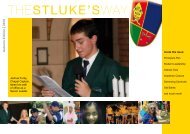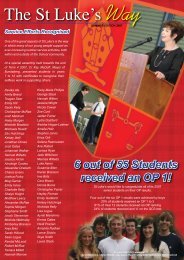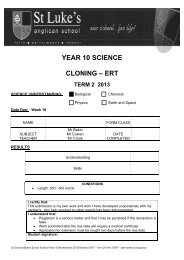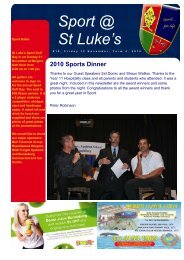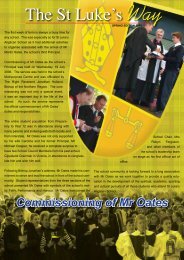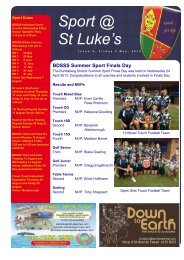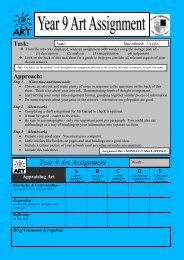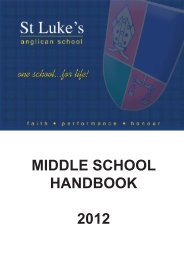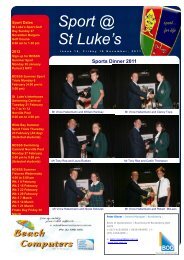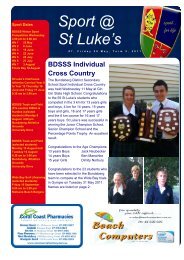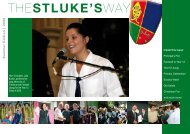Early Learning Centre Parent Handbook - St Luke's Anglican School
Early Learning Centre Parent Handbook - St Luke's Anglican School
Early Learning Centre Parent Handbook - St Luke's Anglican School
Create successful ePaper yourself
Turn your PDF publications into a flip-book with our unique Google optimized e-Paper software.
EARLY LEARNING CENTRE<br />
CRN: 407 058 469 J<br />
PARENT HANDBOOK
Aims and Goals 2<br />
Contacting the ELC 2<br />
Philosophy 3<br />
Introduction 4<br />
Operation of the <strong>Early</strong> <strong>Learning</strong> <strong>Centre</strong> 4<br />
<strong>St</strong>aff 5<br />
Fees and Enrolments 6<br />
Fees 6<br />
Attendance 6<br />
Hours of Operation 7<br />
Sign In and Sign Out 7<br />
Communication 9<br />
Term Dates and Holidays for 2013 9<br />
<strong>Parent</strong>s and Friends’ Association 9<br />
<strong>Early</strong> <strong>Learning</strong> <strong>Centre</strong> Curriculum 10<br />
Kindergarten Funding Scheme 13<br />
Kindergarten Daily Routine 16<br />
Pre-preparatory Daily Routine 17<br />
Requirements – what your child requires for pre-school 18<br />
Kindergarten 18<br />
Pre-preparatory 18<br />
Rest time 18<br />
Special days 18<br />
Shoes versus bare feet 18<br />
Birthdays 19<br />
Treasures from Home 19<br />
Communication 19<br />
Excursions 19<br />
Policies<br />
Enrolments<br />
Inclusion<br />
Relationships with Children<br />
Delivery and Collection of Children<br />
Excursions<br />
Concerns or Grievances<br />
Behaviour Guidance, Children’s Rights and Rights of Others<br />
<strong>St</strong>udents and Volunteers<br />
Workplace Health & Safety<br />
<strong>St</strong>orage of Chemicals and Cleaners<br />
Exclusion from Care<br />
Health & Hygiene<br />
Illness<br />
Administration of First Aid
Children Safe during Water Activities<br />
Child Protection<br />
Suns Protection<br />
Medication<br />
Medical or Allergic Conditions<br />
Immunisation Policy<br />
<strong>Parent</strong> Communication and Involvement<br />
Compliance Log Book<br />
Record Keeping and Privacy<br />
Visitor and <strong>St</strong>udents Involvement<br />
<strong>St</strong>aff, <strong>St</strong>aff Training and Professional Development<br />
Emergency and Evacuation<br />
Our Shared Role<br />
EARLY LEARNING CENTRE AIMS AND GOALS<br />
The needs of the child shall be the first and greatest consideration. With care and education we<br />
will enhance the development of the child and support the family.<br />
We will provide a caring, stimulating and aesthetic environment. This will be a reflection of the<br />
children as they develop at their own pace through learning opportunities that are reflective of their<br />
individual needs.<br />
We will provide a stimulating program making learning a fun, enjoyable and natural experience.<br />
These will incorporate developmental areas including language and literacy, social skills, physical<br />
and cognitive development.<br />
The <strong>Early</strong> <strong>Learning</strong> <strong>Centre</strong> will reflect our cultural diversity, heritage and Christian philosophy. Our<br />
staff will offer guidance with patience, care and skill.<br />
Be a child and have fun.<br />
Experience success through developmentally appropriate activities i.e. creative art, music and<br />
drama, storytelling, manipulative and other forms of play.<br />
Be provided with activities to develop an understanding of mathematical concepts such as shape,<br />
colour, size and numbers. Be provided with experiences to develop an awareness of our<br />
environment, living things and scientific ideas.<br />
Be provided with pre-reading and pre-writing activities and experiences to enrich language and<br />
communication.<br />
Develop a positive self-image and self-esteem by gaining an understanding of their own<br />
uniqueness.<br />
Develop an awareness of health and safety, hygiene and cleanliness.<br />
Develop physical growth and muscular co-ordination through a variety of educational and<br />
playground activities.<br />
Learn appropriate skills necessary to carry out given tasks and develop independence through<br />
play and routines.<br />
CONTACTING THE EARLY LEARNING CENTRE<br />
<strong>St</strong> Luke’s <strong>Early</strong> <strong>Learning</strong> <strong>Centre</strong><br />
4 Mezger <strong>St</strong>reet<br />
Bundaberg, QLD 4670<br />
Telephone: 07 41327539
ST LUKE’S EARLY LEARNING CENTRE PHILOSOPHY<br />
In relation to children<br />
<strong>St</strong> Luke’s <strong>Early</strong> <strong>Learning</strong> <strong>Centre</strong> views learning as both a collaborative and individual journey<br />
whereby children are encouraged to participate and have ownership of their involvement. We<br />
believe play is an integral part of a child’s experiences.<br />
We believe children learn and develop in an all-inclusive environment where they are happy and<br />
secure and have the opportunity to experience a wide range of developmentally appropriate<br />
learning experiences and activities.<br />
Teachers participate in children’s play and support children to negotiate their rights and the rights<br />
of others. Teachers provide direction sensitively when children experience difficulty in resolving a<br />
disagreement.<br />
In relation to families<br />
<strong>St</strong> Luke’s <strong>Early</strong> <strong>Learning</strong> <strong>Centre</strong> believes that families have their own culture and belief system<br />
which makes us all unique, and we will provide an environment whereby we are respectful of<br />
these differences. We encourage families to participate and share in the children’s learning<br />
journey and to communicate and work collaboratively with staff.<br />
In relation to colleagues<br />
<strong>St</strong> Luke’s <strong>Early</strong> <strong>Learning</strong> <strong>Centre</strong> staff promote and make teamwork a priority, encouraging each<br />
other to view learning as collaborative, and supporting each other to achieve common goals. We<br />
recognise the differences in our individual strengths and skills, and therefore we value each other<br />
as individuals and work together as professionals.<br />
In relation to the community<br />
<strong>St</strong> Luke’s <strong>Early</strong> <strong>Learning</strong> <strong>Centre</strong> acknowledges that family and the wider community influences<br />
children’s lives and we encourage their involvement in the centre’s programs and children’s<br />
learning. We welcome members of the community to engage and work with us to promote a<br />
sense of community and belonging.<br />
Inclusion<br />
<strong>St</strong> Luke’s <strong>Early</strong> <strong>Learning</strong> <strong>Centre</strong> staff are actively involved in the development of appropriate<br />
resources which will support and implement an all-inclusive, cross cultural program through the<br />
<strong>Early</strong> <strong>Learning</strong> <strong>Centre</strong> which is reflective of all families and the diversity present in Australian<br />
society.<br />
<strong>St</strong> Luke’s <strong>Early</strong> <strong>Learning</strong> <strong>Centre</strong> believes children develop confidence and self-worth and a<br />
positive self-image as they begin to recognise their uniqueness in an environment that values a<br />
Christian Ethos as practised in the <strong>Anglican</strong> Community.<br />
<strong>St</strong> Luke’s <strong>Early</strong> <strong>Learning</strong> <strong>Centre</strong> Philosophy statement reflects the guiding principles underpinning the National Quality<br />
Framework and the National Quality <strong>St</strong>andards, (ACECQA, 2011, p.7). The Philosophy also reflects the <strong>Early</strong> Years<br />
theorists who inspire us; Vygotsky, Piaget and Reggio Emelia.
OPERATION OF THE EARLY LEARNING CENTRE<br />
<strong>St</strong> Luke’s <strong>Early</strong> <strong>Learning</strong> <strong>Centre</strong>’s Licensee is The Corporation of the Synod of the Diocese of<br />
Bribane, Licence Number 25966 and based at <strong>St</strong> Luke’s <strong>Anglican</strong> <strong>School</strong>, 4 Mezger <strong>St</strong>reet,<br />
Bundaberg, Queensland 4670. The Nominated Licensee is Mrs Susan Wilson, Head of <strong>St</strong> Luke’s<br />
Primary <strong>School</strong>. The daily running of the <strong>Early</strong> <strong>Learning</strong> <strong>Centre</strong> is managed by the <strong>Centre</strong><br />
Director, Mrs Catherine Donaldson. A staff member with an approved supervisor certificate may<br />
be placed in day-to-day charge of the ELC in the absence of the <strong>Centre</strong> Director. The <strong>Centre</strong> is<br />
licensed for 72 children and opened from7.30-5.30pm.<br />
The <strong>Early</strong> <strong>Learning</strong> <strong>Centre</strong> is licensed and regulated by the Office for <strong>Early</strong> Childhood Education<br />
and Care. The Education and Care Services National Regulations and the Education and Care<br />
Services National Law (Queensland) Bill 2011 are the official documents that outline procedures<br />
for the <strong>Centre</strong>. Our Service Identification Number is 1-6PX-697.<br />
<strong>Parent</strong>s wishing to discuss any part of the <strong>Centre</strong>’s operation can contact:<br />
The Office for <strong>Early</strong> Childhood Education and Care<br />
Maryborough Regional Office<br />
102 Lennox <strong>St</strong>reet (PO Box 142)<br />
Maryborough Qld 4650<br />
Telephone: (07) 4190 3871<br />
Facsimile: (07) 4190 3870<br />
STAFF:CHILD RATIOS<br />
The <strong>Early</strong> <strong>Learning</strong> <strong>Centre</strong> is licensed for 72 children and has three classrooms.<br />
Ages of children in class <strong>St</strong>aff:Child Ratio Maximum Class Size<br />
Pre-Preparatory Class A 1:12 24<br />
Pre-Preparatory Class B 1:12 24<br />
Kindergarten 1:12 24<br />
The <strong>Centre</strong> also provides Before/After <strong>School</strong> Care, Occasional Care and Vacation Care and the<br />
staff:child ratio is 1:15.<br />
These ratios are determined by our licensed capacity and the Child Care Regulations 2003,<br />
sections 22, 24 and 25. It is <strong>Centre</strong> policy to ensure that we comply with the Child Care<br />
Regulations 2003 at all times.
ST LUKE’S EARLY LEARNING CENTRE STAFF<br />
<strong>Centre</strong> Director<br />
Catherine Donaldson<br />
Pre-preparatory A Teacher,<br />
Nora Johnstone<br />
Pre-preparatory B Teacher<br />
Jane Bridges<br />
Kindergarten Group Leader<br />
Karen Scutts<br />
Pre-preparatory A – Teacher Aide<br />
Janine Lawrence<br />
Pre-preparatory B – Teacher Aide<br />
Rachel Wellings<br />
Kindergarten Assistant<br />
Terrina Booth<br />
After <strong>School</strong> Care Group Leader<br />
Primary <strong>School</strong><br />
Wendy Gillard<br />
ELC Afternoon Group Leader<br />
& Lunch Relief<br />
Alison Jarvis<br />
After <strong>School</strong> Care Educator<br />
Primary <strong>School</strong><br />
Jennifer Ryan<br />
ELC Afternoon Educator<br />
Katie Taylor<br />
B.A. (Hons) <strong>Early</strong> Childhood <strong>St</strong>udies<br />
Certificate IV Training and Assessment<br />
Diploma in Management<br />
Bachelor of Education – <strong>Early</strong> Childhood<br />
*Educational Supervisor<br />
8.00 am - 4.00 pm<br />
Post Graduate Certificate of Education (R-7)<br />
Bachelor of Arts (Hons) Literature & History<br />
8.00 am - 4.00 pm<br />
Diploma in Children’s Services<br />
Certificate III in Children’s Services<br />
7.30 am – 3.30 pm<br />
Diploma in Children’s Services<br />
Certificate III in Children’s Services<br />
8.00 am – 4.00 pm<br />
Diploma in Children’s Services<br />
7.30 am – 3.30 pm<br />
Certificate III Children’s Services<br />
8.00 am – 4.00 pm<br />
Diploma in Children’s Services<br />
3.00 pm - 5.30 pm<br />
Diploma in Children’s Services<br />
12-00 pm - 3.00 pm<br />
3.00 pm - 5.30 pm<br />
Diploma in Children’s Services<br />
3.00 pm -5.30 pm<br />
Diploma in Children’s Services (studying)<br />
3.00 pm – 5.30 pm<br />
* Educational Supervisor monitors programs being implemented, to ensure that programs meet the<br />
requirements of the <strong>Early</strong> Years <strong>Learning</strong> Framework and the Kindergarten <strong>Learning</strong> Guidelines.
FEES AND ENROLMENTS<br />
Fees for Pre-preparatory, Kindergarten, Before <strong>School</strong> Care and Vacation Care programs are<br />
subject to change in 2013.<br />
Note: A penalty rate of $10 will be charged for every 15 minutes after 5.30 pm.<br />
Fees for each period (either term or holiday) are due on the date shown on the fee statement.<br />
Fees are payable for all days of enrolment regardless of attendance, absences.<br />
Child Care Benefits may be claimed for the <strong>Early</strong> <strong>Learning</strong> <strong>Centre</strong>, Vacation Care and Before and<br />
Afternoon <strong>School</strong> Care. The <strong>Centre</strong>’s Service ID Number 1-6-PX-697 when contacting<br />
<strong>Centre</strong>link.<br />
ATTENDANCE<br />
Kindergarten Classroom<br />
Children can be enrolled for two days (Thursday and Friday), three days (Monday to Wednesday)<br />
or five days each week, with a maximum of 24 students in each daily group. Children must have<br />
reached the age of 3 years before they are eligible to commence Kindergarten. Children attending<br />
the Kindergarten program are between the ages of 3 and 4 years.<br />
Pre-Preparatory Classroom<br />
Children can be enrolled for two days (Thursday and Friday), three days (Monday to Wednesday)<br />
or five days each week, with a maximum of 24 students in each daily group. Children must turn 4<br />
years of age before 30 June in the year of entry to be eligible to commence Pre-preparatory.<br />
Children attending the Pre-preparatory program are between the ages of 3½ and 5 years.<br />
The Kindergarten program is implemented between 8.00 am - 4.00 pm (this includes outdoor<br />
activities from 3.15 pm until 5.30 pm).<br />
Before and After <strong>School</strong> Facilities<br />
The <strong>Centre</strong> offers an out of school hours care program. This program includes Before and After<br />
<strong>School</strong> Care as well as Vacation Care. Before <strong>School</strong> Care operates from 7.30 am - 8.15 am.<br />
<strong>St</strong>aff to child ratio is 1:15.<br />
At 8.00am they will be escorted to <strong>St</strong> Luke’s Primary <strong>School</strong>. After <strong>School</strong> Care operates between<br />
3.00 pm - 5.30 pm. Primary children are collected at a central point at <strong>St</strong> Luke’s Primary <strong>School</strong><br />
and escorted to the <strong>Early</strong> <strong>Learning</strong> <strong>Centre</strong> by staff members. Afternoon tea is provided. The<br />
My Time, Our place out of school care program provides opportunities for children to plan the<br />
sessions and select their own activities and experiences according to their ideas and interests.<br />
Educators will collaborate with children to facilitate routines.
HOURS OF OPERATION<br />
The <strong>Centre</strong> operates from 7.30 am to 5.30 pm each day.<br />
A child may be dropped off and collected at a time suitable to the parent; however, a full day’s fee<br />
will be charged regardless of the number of hours a child is in attendance.<br />
TERM DATES FOR 2013<br />
Term 1:<br />
Term 2:<br />
Term 3:<br />
Term 4:<br />
Tuesday 29 January – Thursday 28 March<br />
Monday 15 April – Friday 21 June<br />
Tuesday 16 July – Friday 20 September<br />
Tuesday 8 October – Thursday 5 December<br />
THE CURRICULUM<br />
The <strong>St</strong> Luke’s <strong>Early</strong> <strong>Learning</strong> <strong>Centre</strong> Programs are guided by The <strong>Early</strong> Years <strong>Learning</strong><br />
Framework for Australia. This is a National <strong>Early</strong> Years <strong>Learning</strong> Framework for early childhood<br />
educators to extend and enrich children’s learning from birth to five years and through the<br />
transition to school.<br />
KINDERGARTEN CLASSROOM<br />
The Kindergarten program implements the <strong>Early</strong> Years <strong>Learning</strong> Framework which involves a<br />
collaborative approach with both children and teachers. The framework of this curriculum is<br />
outlined in the following:<br />
OUTCOME 1.<br />
• Children have a strong sense of identity<br />
• Social and Personal <strong>Learning</strong><br />
• Developing confidence, empathy, care and concern<br />
OUTCOME 2.<br />
• Children are connected with and contribute to their world<br />
• Sharing, co-operating, listening, developing independence<br />
• Contributing to their environment<br />
• Child initiated activities<br />
OUTCOME 3<br />
• Children have a strong sense of wellbeing<br />
• Health and Physical Wellbeing<br />
• Fine and Gross Motor<br />
• Music and movement
OUTCOME 4.<br />
• Children are confident and involved learners<br />
• Cognitive <strong>Learning</strong> Process<br />
• <strong>Early</strong> Mathematical Understandings<br />
• Thinking/Problem Solving<br />
• Creativity and craft<br />
• Imagination<br />
OUTCOME 5.Children are effective communicators<br />
• Language and Communication<br />
• Conversation<br />
• Sharing thoughts and ideas<br />
• <strong>St</strong>ories/Books<br />
• Pre-reading<br />
PRE-PREPARATORY CLASSROOM<br />
The Pre-preparatory program is based on the Queensland Kindergarten <strong>Learning</strong> Guidelines.<br />
This document outlines the following <strong>Early</strong> <strong>Learning</strong> Areas as being associated with later success<br />
in school.<br />
While the EYLF focuses on children from birth to five years, the Queensland Kindergarten<br />
<strong>Learning</strong> Guideline aims to specifically enrich children’s learning in the Kindergarten (Prepreparatory)<br />
Year. In Queensland, the Kindergarten (Pre-preparatory) Year is the year before the<br />
Preparatory Year of schooling. Throughout the Pre-preparatory Year, children’s right to<br />
experience the joy of childhood is fundamental and learning is promoted through play, emergent<br />
and planned learning experiences and collaboration between teachers and children.<br />
Foundation <strong>Learning</strong> Area 1 - Identity<br />
A kindergarten child who has a strong sense of identity:<br />
• is building a sense of security and trust<br />
• acts with increasing independence and perseverance<br />
• is building a confident self-identity.<br />
Related EYLF learning outcome: Children have a strong sense of identity.<br />
Foundation <strong>Learning</strong> Area 2 - Connectedness<br />
A kindergarten child who is connected with and contributes to their world:<br />
• is building positive relationships with others<br />
• shows increasing respect for diversity<br />
• shows increasing respect for environments.<br />
Related EYLF learning outcome: Children are connected with and contribute to their world.<br />
Foundation <strong>Learning</strong> Area 3 - Wellbeing<br />
A kindergarten child who has a strong sense of wellbeing:<br />
• is building a sense of autonomy and wellbeing
• explores ways to show care and concern and interact positively with others<br />
• explores ways to promote own and others’ health and safety<br />
• explores ways to promote physical wellbeing.<br />
Related EYLF learning outcome: Children have a strong sense of wellbeing.<br />
Foundation <strong>Learning</strong> Area 4 - Active learning<br />
• A kindergarten child who is a confident and involved learner:<br />
• is building positive dispositions and approaches toward learning<br />
• shows increasing confidence and involvement in learning<br />
• engages in ways to be imaginative and creative<br />
• explores tools, technologies and information and communication technologies.<br />
Related EYLF learning outcome: Children are confident and involved learners.<br />
Foundation <strong>Learning</strong> Area 5 - Communicating<br />
A kindergarten child who is an effective communicator:<br />
• explores and expands ways to use language<br />
• explores and engages with literacy in personally meaningful ways<br />
• explores and engages with numeracy in personally meaningful ways.<br />
Related EYLF learning outcome: Children are effective communicators.<br />
The children are introduced to many skills during the year. Each child develops at an individual<br />
rate. Mastery of these developmental skills will vary from child to child. Each child’s development<br />
in the <strong>Early</strong> <strong>Learning</strong> Area will be recorded in their folios. Folios will record development in all<br />
areas throughout the year.<br />
The Teacher uses their professional judgment and observations of the child to record their<br />
findings. This document is used with other child study tools including a reflective teacher diary,<br />
photographs, work samples, notes from parent interviews and other relevant checklists or<br />
assessment tasks plus information from other services and professionals if applicable.<br />
Each child has a <strong>Learning</strong> <strong>St</strong>ory folio which includes photographs, observations, children’s work<br />
samples etc. This <strong>Learning</strong> <strong>St</strong>ory folio is added to on a weekly basis and is available for<br />
parents/guardians to look at and revisit with their child at any time.<br />
Queensland Kindergarten Funding Scheme<br />
There is a range of criteria that approval of a service as a Kindergarten program provider is<br />
assessed against. These include:<br />
• Children in the year prior to Prep (who are 4 years old by 30 June in the year participate in<br />
an approved kindergarten program) for at least 15 hours per week and 40 weeks per year<br />
• is aligned with the Queensland Kindergarten <strong>Learning</strong> Guideline and the principles of the<br />
national <strong>Early</strong> Years <strong>Learning</strong> Framework (EYLF)<br />
• Program is delivered by:<br />
- an early childhood education teacher, who holds an early childhood qualification(s) that<br />
meets the requirements of the Child Care Act 2002 and sections 113 [(a) to (c)] or 114<br />
of the Child Care Regulation 2003.
Kindergarten Daily Routine<br />
7.30 am Before <strong>School</strong> Care – Kindy classroom<br />
Table and play mat activities<br />
8.45 am Bell rings. Pack up time.<br />
Group Time (on mat) – Good Morning, <strong>School</strong> Prayer, Mark the roll,<br />
Weather Chart, What’s on today in kindy. Children and teachers<br />
will plan the day together, including teacher and child initiated tasks,<br />
activities and play (explicit teaching – focused teaching planned).<br />
9.10 am Outdoor activities – including obstacle course<br />
10.20 am Children will pack up within their area and transition to morning tea.<br />
Grace and Morning Tea.<br />
10.30 am Morning Tea. Teachers will join with the children at the table for conversation and to<br />
encourage healthy choices and socially appropriate behaviours.<br />
11.00 am Music and Movement program: Dance, musical instruments, singing,<br />
finger-plays, creative expression.<br />
11.20 am Transition to small groups for child initiated tasks and intentional teaching-directed<br />
activities (early literacy/language/mathematics/and science concepts).<br />
12.20 pm Bell rings. Children will pack up their area for transition to the bathroom. Children<br />
will make up their beds for rest period.<br />
12.45 pm Grace and Lunch. Teachers will join the children at the table for conversation and to<br />
encourage healthy food choices and socially appropriate behaviours.<br />
1.15 pm Rest Period – Children are provided with an environment that is quiet, calm and<br />
peaceful. Children are not required to sleep, however, they<br />
are encouraged to rest their bodies.<br />
2.30pm<br />
Pack up beds<br />
2.50 pm Carpet Time – intentional teaching, reflect upon the day’s events and<br />
experiences, share a story and conversation.<br />
3.00 pm Classroom doors open at 3.00 pm.<br />
3.15 pm Outdoor program and free play.<br />
5.30 pm
Pre-Prep Daily Routine<br />
7.30 am Before <strong>School</strong> Care Program begins.<br />
8.00 am <strong>Parent</strong>s and children are welcomed by their teachers.<br />
Activities provided – indoor/outdoor<br />
8.30 am Bell rings. Group Time (on mat) – Good Morning, <strong>School</strong> Prayer, Mark the roll,<br />
Weather Chart, What’s on today in Pre-prep. Children and teachers will plan the day<br />
together, including teacher and child initiated tasks, activities and play (explicit<br />
teaching – focused teaching planned).<br />
8.45 am Outdoor Program children will have access to a variety of teacher and child initiated<br />
free choice activities.<br />
10.00 am Bell rings. Children pack up their area and meet on their verandah.<br />
10.05 am Music and Movement program: Dance, musical instruments, singing,<br />
finger-plays, creative expression<br />
10.20 am Grace and Transition to bathroom.<br />
10.30 am Morning Tea. Teachers will join with the children at the table for conversation and to<br />
encourage healthy choices and socially appropriate behaviours.<br />
11.00 am Indoor session commences – spontaneous learning will happen and underpins what<br />
happens next day (teacher initiated periods).<br />
.<br />
Small groups for intentional teaching directed activities.<br />
(early literacy/language/mathematics/science concepts).<br />
12.45pm<br />
Bell rings. Pack up time.<br />
Children will make up their beds for rest period.<br />
1.00 pm Grace and Lunch. Transition to bathroom and out to lunch. Teachers will join<br />
children at the table for conversation and to encourage healthy food choices and<br />
socially appropriate behaviours.<br />
1.30 pm Rest Period.<br />
Children are provided with an environment that is quiet, calm and peaceful.<br />
Children are not required to sleep, however they are encouraged to rest<br />
their bodies.<br />
2.45pm<br />
Carpet Time – Intentional teaching, reflect upon the day’s events and<br />
experiences, share a story and conversation.<br />
3.00 pm Classroom doors open at 3.00 pm.<br />
3.15 pm Outdoor program and free play.<br />
5.30 pm
REQUIREMENTS - WHAT YOUR CHILD REQUIRES FOR KINDERGATEN & PRE-<br />
PREPARATORY<br />
Each child will need a large bag to hold lunch and morning tea, school hat and ELC uniform shirts<br />
(which can be purchased at <strong>St</strong> Luke’s uniform shop), spare clothes and a labeled drink bottle<br />
containing water.<br />
Morning Tea and Lunch in a named lunch box – for morning tea we suggest;<br />
• fresh or dried fruit, raw vegetables, cheese or yoghurt.<br />
A nourishing, wholesome lunch of fresh food is also desirable; –<br />
• sandwiches, spaghetti, baked beans, chicken, salad, cheese, crackers, fruit salad,<br />
fresh fruit, yoghurt are good options.<br />
To encourage good nutritional habits, please no;<br />
• chips, lollies, soft drinks or chewing gum, popcorn or canned drinks.<br />
To keep children safe from allergic reactions;<br />
• NO peanuts, or food containing peanuts in children’s lunchboxes.<br />
Please note that it is important not to send food in tins, tin food to be placed in plastic<br />
containers.<br />
Please use plastic containers for food and drink. Glass containers are not permitted.<br />
We have a refrigerator for any items that need to stay cold. To promote sustainability we<br />
requested limited use of plastic sandwich bags. Smaller plastic containers inside lunchboxes are<br />
preferable.<br />
Sheets and Sheet bag – The children will need a sheet and a sheet bag. The sheet needs to be<br />
approximately half a single sheet. A drawstring bag to hold this sheet is also required. The child’s<br />
name should be on both items in large letters. The beds will be available for measuring at your<br />
request should you wish to make a fitted sheet.<br />
Spare Clothes – Please send along a NAMED set of spare clothes as we do messy and wet<br />
activities each day or in case your child has an ‘accident’.<br />
Please send your child in sensible play clothes, not good clothes, as they may get paint or dirt on<br />
them. Please make sure your child can handle his/her clothing at toilet time as this becomes<br />
frustrating for them if they can’t manage themselves. Pre-preparatory blue shirt is compulsory and<br />
can be purchased at <strong>St</strong> Luke’s uniform shop.<br />
.<br />
STATIONERY ITEMS REQUIRED<br />
The following items are required for the children’s daily program.<br />
Kindergarten<br />
1 x ream A4 white paper<br />
1 x Plastic Pockets box 100<br />
1 x A4 White 4 ring Binder (38mm)
1 x Glue sticks<br />
1 x family box of tissues<br />
1 x Oil Pastel Crayons<br />
1 x Felt Tip pens (thick)<br />
Pre-prep<br />
1 x uncovered A4 scrap book - Olympic #325<br />
1 x A4 White 4 ring binder (38mm)<br />
1 x ream A4 white paper<br />
1 x Plastic sleeves (box of 100)<br />
1 x A3 Sketch Pad<br />
2 x Glue sticks<br />
1 x family box of tissues<br />
1 x Felt Tip pens (thick)<br />
Please put your child’s name clearly on scrapbooks.<br />
REST TIME<br />
A licence condition of our centre is that the service may provide one or more periods during a day,<br />
totalling not more than 2 hours during the day. The <strong>Early</strong> <strong>Learning</strong> <strong>Centre</strong> has rest period from<br />
1.30pm to 2.30pm. Rest periods are a time when children have a chance to relax and engage in a<br />
period of quiet time. <strong>St</strong>aff will be sensitive to the needs of your child during this time.<br />
SPECIAL DAYS<br />
After the completion of themes or because of special times of the year, we plan to have party<br />
days at the <strong>Early</strong> <strong>Learning</strong> <strong>Centre</strong> - parents are most welcome to join in and be part of the fun.<br />
Information will reach you via the newsletters and notices.<br />
SHOES VERSUS BARE FEET<br />
Our <strong>Early</strong> <strong>Learning</strong> <strong>Centre</strong> recognises the benefits of bare footed play for children’s safety and<br />
growth and the development of sensory awareness. Shoes can be hazardous in outdoor play<br />
areas. Bare feet provide the safest climbing grip and promote more effective balance and control<br />
eg, during music or when climbing.<br />
Children should arrive and depart <strong>School</strong> with footwear on. It is important that EVERYTHING is<br />
clearly named.<br />
BIRTHDAYS<br />
A birthday is a very special time for a child at the <strong>Early</strong> <strong>Learning</strong> <strong>Centre</strong>. On this special occasion<br />
you are welcome to bring along a cake for your child to share with his/her friends. Children whose<br />
birthdays fall in the holidays may share their birthday before or after the holidays.<br />
TREASURES FROM HOME
While we don’t wish to dampen your child’s enthusiasm, we would appreciate it if toys brought<br />
from home were limited to those received on a special occasion. We are not responsible if<br />
anything gets broken or misplaced. However, your child is encouraged to bring to the <strong>Early</strong><br />
<strong>Learning</strong> <strong>Centre</strong> any type of interesting specimen or object - rocks, shells, insects, etc. to enrich<br />
the science program. Please be careful to provide air holes for insects to breathe. Plastic<br />
containers are safer than glass.<br />
ABSENCES<br />
All parents are requested to notify the <strong>Early</strong> <strong>Learning</strong> <strong>Centre</strong> of their child’s absence as soon as<br />
possible. If the absence is due to an infectious disease notification must be given immediately<br />
after the diagnosis. A child will not be readmitted without a written clearance from the child’s<br />
doctor.<br />
COMMUNICATION<br />
We feel open communication between teachers and parents’ is very important and builds trust.<br />
Please feel free to discuss your child’s progress or any concerns you may have with the teacher. If<br />
you wish to speak at length about something, please arrange a mutually agreeable time out of<br />
sessions.<br />
The <strong>Early</strong> <strong>Learning</strong> <strong>Centre</strong> produces a bi-monthly newsletter that highlights forthcoming events<br />
and special days relating to the children. In an effort to promote responsible environmental<br />
practices, these newsletters are preferably distributed via email, so we would appreciate you<br />
updating the <strong>School</strong> with changes to your email address.<br />
CONCERNS OR GRIEVANCES<br />
Aim: to ensure that there is a procedure to follow in the event of any queries or concerns.<br />
Open communication is the key to successful partnerships within the <strong>Early</strong> <strong>Learning</strong> <strong>Centre</strong> and<br />
between families and staff. Having a procedure to follow encourages this and allows issues to be<br />
dealt with thoroughly, comprehensively and with sensitivity towards all concerned.<br />
Concerns of <strong>Parent</strong>s<br />
• Each classroom has a parent feedback box and parent communication boxes should<br />
parents prefer to put any concern or grievance in writing.<br />
• We also encourage constructive feedback on any aspect of the <strong>Early</strong> <strong>Learning</strong> <strong>Centre</strong> as<br />
any point raised will provide the opportunity to continuously reflect and improve on the<br />
quality within our <strong>Centre</strong>.<br />
• <strong>Parent</strong>s are encouraged to discuss any concerns or thoughts directly with <strong>Centre</strong> Director<br />
or the teachers.<br />
• Whereby the issue is not fully resolved parents may contact Head of Primary on 41327525.<br />
• Should parents feel the need to contact The Office for <strong>Early</strong> Childhood Education and Care,<br />
the contact details are:<br />
Office for <strong>Early</strong> Childhood Education and Care
Wide Bay/Burnett<br />
Maryborough Regional Office<br />
102 Lennox <strong>St</strong>reet, P.O. Box 142<br />
Maryborough, Queensland 4670<br />
Tel: OECEC Officer: Jillian Frith (07) 41903871<br />
Concerns of <strong>St</strong>aff Members<br />
The <strong>Early</strong> <strong>Learning</strong> <strong>Centre</strong>’s goal if for staff to have an enjoyable and fulfilling workplace.<br />
We acknowledge that there may be times when staff members are unhappy with their role<br />
or have been upset by the actions of another staff member. Where such a situation exists it<br />
is best for the issue to be resolved quickly by the following procedures:<br />
• See the person concerned and talk out the issue in an appropriate environment. Attempt to<br />
come to a mutual agreement.<br />
• Where agreement cannot be reached it is recommended that the <strong>Centre</strong> Director be invited<br />
to mediate.<br />
• <strong>St</strong>aff are encouraged at any time to offer suggestions regarding any aspect of the <strong>Centre</strong>.<br />
STUDENTS AND VOLUNTEERS<br />
The <strong>Early</strong> <strong>Learning</strong> <strong>Centre</strong> is committed to high quality and training opportunities including the<br />
opportunity for students and volunteers to experience work experiences. Where students and<br />
volunteers do not have the requisite training and qualifications to work in preschools the following<br />
provisions will apply:<br />
• The student/volunteer holds a current positive suitability notice.<br />
• The student/volunteer will sign in/out using the visitor’s log book.<br />
• The <strong>Centre</strong> Director will interview student/volunteer who will assign tasks consistent with<br />
perceived skills and experience and provided with <strong>Centre</strong> policies and procedures.<br />
• The student/volunteer will not form part of the formal <strong>Centre</strong> team and will not be given no<br />
responsibility for supervision of children.<br />
• The student/volunteer will not be left alone with children at any given time.<br />
• <strong>Parent</strong>s will be informed of any students in the <strong>Centre</strong> via a notice on parent notice board.<br />
SCHOOL COMMUNITY CODE OF CONDUCT<br />
All children, students, parents, teachers, staff, volunteers and families have the right to be safe,<br />
and feel safe, in their school community. The <strong>School</strong> Community Code of Conduct sets clear<br />
standards of behaviour, which are expected of members of the <strong>School</strong> Community. With this right<br />
comes the responsibility to be accountable for actions that intimidate or put at risk the safety of<br />
others or oneself.<br />
ENROLMENTS<br />
<strong>Parent</strong>s may submit an Application for Admission any time after their child’s birth for their child’s<br />
name to be placed on the waiting list. Prospective students are placed on the waiting list in order<br />
of application dates received and by payment of a non-refundable fee of $100. <strong>Parent</strong>s will be
contacted the year prior to their child’s attendance in the <strong>Early</strong> <strong>Learning</strong> <strong>Centre</strong> and offered a<br />
place, should there be a vacancy. An enrolment confirmation fee of $80 and a refundable deposit<br />
of $200 is payable at this time. Total fees payable before your child commences at the <strong>Early</strong><br />
<strong>Learning</strong> <strong>Centre</strong> is $380 – $200 deposit is refunded, when your child departs <strong>St</strong> Luke’s, providing<br />
there is no outstanding debt and that a term’s notice is given in writing, advising of your child’s<br />
withdrawal. No other fees are payable as your child moves from the <strong>Early</strong> <strong>Learning</strong> <strong>Centre</strong> to<br />
Preparatory Year and beyond.<br />
Children attending Kindergarten or Pre-preparatory will automatically be offered a place for the<br />
following year in the relevant year level, depending on their age. However, it is not a requirement<br />
to continue on through the <strong>St</strong> Luke’s <strong>School</strong>. <strong>Early</strong> <strong>Learning</strong> <strong>Centre</strong> places are offered in strict<br />
order of the waiting list and via the selection process set out by Government guidelines and<br />
<strong>School</strong> policy. Children already attending the <strong>Centre</strong> and who remain for another year at the<br />
<strong>Centre</strong> are given priority.<br />
Families will be orientated around the <strong>Early</strong> <strong>Learning</strong> <strong>Centre</strong> by <strong>St</strong> Luke’s <strong>School</strong> Marketing and<br />
Development.<br />
The <strong>Early</strong> <strong>Learning</strong> <strong>Centre</strong>’s Orientation Day is an opportunity for children and families to meet<br />
and greet teachers before formal commencement. There will be an Orientation Day at the start of<br />
school year, and an Open Day in Term 3.<br />
INCLUSION<br />
When children enter an <strong>Early</strong> Childhood setting, they bring with them a rich variety of cultural and<br />
social backgrounds and experiences. <strong>St</strong> Luke’s <strong>Early</strong> <strong>Learning</strong> <strong>Centre</strong> recognises the individuality<br />
of each child and family and observes a policy of acceptance regardless of race, creed, gender,<br />
disability, class or culture.<br />
Our policy is to provide non-discriminatory access to all children. We do not exclude children from<br />
other races or cultural backgrounds, or those who have physical disabilities.<br />
RELATIONSHIPS WITH CHILDREN<br />
<strong>St</strong> Luke’s <strong>Early</strong> <strong>Learning</strong> <strong>Centre</strong> views learning as both a collaborative and individual journey<br />
whereby children are encouraged to participate and have ownership of their involvement. We<br />
believe play is an integral part of a child’s experiences.<br />
We believe children learn and develop in an all-inclusive environment where they are happy and<br />
secure, have the opportunity to experience a wide range of developmentally appropriate learning<br />
experiences and activities.<br />
Teachers will participate in supervision and provide direction sensitively when children experience<br />
difficulty in resolving a disagreement.<br />
BEHAVIOUR GUIDANCE, CHILDREN’S RIGHTS AND RIGHTS OF OTHERS<br />
Teachers will participate in children’s play and will support children to negotiate their rights and the<br />
rights of others. Teachers will provide direction sensitively when children experience difficulty in
esolving a disagreement. <strong>St</strong>aff model appropriate behavior to children and will provide a<br />
supportive environment where children are given consistent opportunities and positive guidance<br />
and encouragement toward learning acceptable social behaviours.<br />
DELIVERY AND COLLECTION OF CHILDREN<br />
When you bring your child to the <strong>Centre</strong> it is very important to sign your child in and out each day.<br />
It is required by Department of Education, Employment and Workplace Relations (DEEWR) and<br />
Child Care Regulation 2003 that parents/guardians name, sign and specify the time of arrival and<br />
name, sign and specify the time of departure of their child/ren from the centre each day. Name<br />
and signature of parent/guardian also apply should enrolled child/ren be absent for any reason<br />
The Child Care Regulations state that each child must be delivered to and collected from the<br />
<strong>Centre</strong> by an adult and collected by a parent/guardian of the child. Alternative arrangements can<br />
be made by the parents; however, authorization must be in writing and must indicate who else<br />
may deliver and/or collect their child from the <strong>Centre</strong>. Without written authorisation the <strong>Centre</strong><br />
Director has the right to not allow a child to leave the <strong>Centre</strong>.<br />
It is permissible for you to arrange for an adult other than yourself to collect and drop off your child<br />
only if you have given your written consent for them by completing a Departure Authorisation form.<br />
Identification will be required.<br />
EXCURSIONS<br />
On occasions, the children will be taken on excursions to complement the curriculum. At other<br />
times visitors will be invited to the <strong>Centre</strong> to offer the children an extension of their current<br />
program. <strong>Parent</strong>s will be notified of forthcoming excursions through newsletters. A Risk<br />
Assessment will be carried out before an excursion takes place.<br />
Risk assessments will identify and assess risks that the excursion may pose to the safety, health<br />
or wellbeing of any child being taken on the excursion. Risk assessments will also specify how the<br />
identified risks will be managed and minimized.<br />
It would be greatly appreciated if parents could assist staff with supervision of these days.<br />
Permission slips will be issued for each excursion and must be signed by parent(s) prior to<br />
departure. Children are required to wear suitable closed-in footwear and sun smart clothing on<br />
these occasions.<br />
CHILDREN SAFETY DURING WATER ACTIVITIES.<br />
Water activities or water play will at all times be closely supervised by a staff member.<br />
Water trays and containers will be emptied and stored safely away after water play activities.<br />
Risk assessments will be carried out for any activity or event that involves being near water or in<br />
water outside the centre.<br />
Source: Education & Care Services National Regulations<br />
(under the Education & Care Services National Law, 2011)
WORKPLACE, HEALTH & SAFETY<br />
Workplace, Health and Safety is a priority at the <strong>Early</strong> <strong>Learning</strong> <strong>Centre</strong> and we are committed to<br />
providing a safe environment for everyone. All risks are identified, evaluated and dealt with<br />
promptly. The <strong>Centre</strong> ensures that:<br />
• Personal protective equipment is supplied as necessary..<br />
• Records of all children’s injuries and illnesses are kept.<br />
• A Health & Safety representative is elected.<br />
• Health & Safety concerns identified by staff and addressed by WHSO.<br />
• Safe systems and procedures are in place. Procedures protect families, children,<br />
staff, volunteers and all other stakeholders. Procedures includes evacuation procedures<br />
and regular safety audits.<br />
Source: Work Health & Safety Act 2011<br />
STORAGE OF CHEMICALS AND CLEANERS<br />
• The <strong>Centre</strong> has data sheets concerning all chemicals on premises<br />
• Emergency action documents are kept in kitchen and at cleaners ‘ cupboard.<br />
• All other chemicals and hazardous substances are clearly labeled and are stored in a safe<br />
manner out of children’s reach.<br />
Source: Workplace, Health & Safety Regulation (1997) Part 13 (Hazardous Substances,<br />
sections 87 to 114): Education & Care Services National Regulations<br />
(under the Education & Care Services National Law, 2011)<br />
EXCLUSION FROM THE CENTRE<br />
The <strong>Centre</strong> reserves the right to refuse or withdraw children from care, temporarily or permanently,<br />
for any of the following reasons:<br />
• Children with contagious or communicable diseases<br />
• Inappropriate behaviour on the part of a child<br />
• Inappropriate behaviour on the part of a parent/guardian<br />
• Non-payment of fees (payable fortnightly)<br />
• Children who have not been immunized<br />
• Children with head lice<br />
• Children who are visibly unwell or have a temperature over 38 degrees centigrade.<br />
<strong>St</strong>aying Healthy in Child Care 2012, 5 th edition – Preventing infectious diseases<br />
HEALTH & HYGIENE<br />
To keep our children healthy the following hygiene procedures apply:<br />
• <strong>St</strong>aff and children are to wash their hands after wiping a nose, before handling food,<br />
after toileting, after handling cleaning products or touching blood.
• <strong>St</strong>aff to wear protective gloves when handling food, assisting with toileting, handling<br />
soiled items, wiping noses and attending to wounds.<br />
ILLNESS<br />
Children who are sick cannot attend or remain at the <strong>Centre</strong>. If a child has any of the following<br />
illnesses, parents/guardians will be called to collect their child immediately:<br />
• Vomiting<br />
• Diarrhoea<br />
• Conjunctivitis<br />
• Rashes and blisters<br />
• Impetigo (school sores)<br />
• Hair lice<br />
• Temperature over 38 degrees<br />
• Or any other condition that may put other children at health at risk<br />
Where a child has been sent home with sickness or illness children must remain absent from the<br />
<strong>Centre</strong> for 24 hours.<br />
If a child should become ill or has an accident during session times, a parent will be contacted in<br />
regards to this. Please ensure all contact numbers are current. In the event of neither parent being<br />
contactable it is the <strong>Early</strong> <strong>Learning</strong> <strong>Centre</strong>’s policy that staff will telephone emergency contacts<br />
and then medical attention will be sought at the teacher’s discretion. If considered necessary we<br />
will obtain the service of an ambulance to take your child to hospital.<br />
Source: www.health.qld.gov.au – Time Out 10/12<br />
ADMINISTRATION OF FIRST AID<br />
In the event of a child sustaining an injury, the following procedures will be followed:<br />
A staff member holding a current first aid certificate will render appropriate first aid to tchild.<br />
The cause or site of the accident is made safe.<br />
The child’s parent/guardian is immediately informed.<br />
A full description of the accident including names of any witnesses are recorded in an<br />
incident report as soon as possible after the accident and brought to the attention of the<br />
director. Additional details to be recorded include time and date of accident, parent<br />
contacted and by who, details of first aid administered, any strategies for future prevention.<br />
Should an injured child require hospitalization the director will ensure that the Office of <strong>Early</strong><br />
Childhood Education and Care is informed as soon as possible.<br />
CHILD PROTECTION<br />
• Under the Child Protection Act 1999 staff have the right and obligation to document and<br />
report any suspected cases of child abuse (physical, emotional, sexual, neglect) to the<br />
appropriate authorities with the Department of Child Safety.
• <strong>St</strong>aff will follow the <strong>School</strong>’s procedure on documenting and reporting any suspected cases<br />
of child abuse. A staff member is not liable, civilly, criminally or under an administrative<br />
process for giving a report of ‘likely sexual abuse’.<br />
• Suspected incidences of child abuse or neglect are to be reported immediately to <strong>Centre</strong><br />
Director. <strong>Centre</strong> Director will compile relevant reports and inform the Licensee, Principal<br />
and report to the Office of <strong>Early</strong> Childhood.<br />
Source: Child Protection Act 1999 / Independent <strong>School</strong>s Queensland:Child Protection<br />
SUN PROTECTION<br />
As part of our sun-safe policy, the <strong>Early</strong> <strong>Learning</strong> centre requires:<br />
• We implement the “No hat, no outdoor play” policy. All children to wear the recommended<br />
<strong>Early</strong> <strong>Learning</strong> <strong>Centre</strong> hat (or wide brimmed or bucket hat) and clothes which offers adequate<br />
sun protection.<br />
• <strong>St</strong>aff will ensure that all children playing outside are protected with a sunscreen with a 30+<br />
rating prior to outdoor activities.<br />
• Children are encouraged to make use of shaded areas for play activities.<br />
• <strong>Parent</strong>s will be provided with current Sun Smart information via brochures displayed at the<br />
<strong>Centre</strong><br />
• The <strong>Centre</strong> will provide and display sun care literature from the Queensland Cancer Council<br />
and Sun Smart education is delivered as an integral part of our program.<br />
Source: www.cancerqld.org.au<br />
MEDICATION<br />
We will administer prescribed medication to your child on your request only and within the<br />
following guidelines:<br />
• Details regarding a child’s medication must be entered on the medication form by the<br />
parent/guardian, upon arrival at the centre, recording the following: Child’s name, Date,<br />
Drug, Dosage, Time(s) due and Signature.<br />
• The staff member administering medication and witness must sign the medication form<br />
when medication is given.<br />
• <strong>St</strong>aff will only administer medication to a child if his/her name is on the label.<br />
• All medication must be handed to a staff member for safe storage/handling. Under no<br />
circumstances must any medication be left in a child’s bag.<br />
The request is to be made in writing each day the medication is to be administered.<br />
Prior written consent by the parent is required on enrolment with respect to paracetamol before the<br />
initial dose of paracetamol will be administered for high fever.
POLICY – MEDICAL OR ALLERGIC CONDITIONS<br />
If your child has an allergy parent/guardians are required to provide a medical management/action<br />
plan for the child. This plan will be followed in the event of an incident relating to our child’s health<br />
care need, allergy or relevant medical condition.<br />
To minimize allergic reactions the ELC has a ‘no peanut’ request for parents not to send any food<br />
containing peanuts in children’s lunch boxes.<br />
Please ensure that the ‘<strong>St</strong>udent, Family and Medical Details’ form is kept up-to-date including<br />
immunisations. <strong>Parent</strong>s are required to put in writing and notify staff of any changes to medical<br />
conditions or allergies your child may have. All staff hold a current First Aid Certificate. Your child’s<br />
physical safety is important to us.<br />
Queensland Government website: National Immunisation Program Schedule<br />
POLICY - IMMUNISATION POLICY<br />
The <strong>School</strong> requires a copy of your child’s immunisation records. <strong>Parent</strong>s who have made the<br />
decision NOT to immunise their child, will have to sign a <strong>St</strong>atutory Declaration agreeing to the<br />
removal of their child from the centre in the event of a contagious disease being present in the<br />
<strong>Early</strong> <strong>Learning</strong> <strong>Centre</strong>.<br />
Queensland Government website: Recommended Immunisations for <strong>Early</strong> Childhood Educators<br />
and <strong>St</strong>aff<br />
PARENT COMMUNICATION & INVOLVEMENT<br />
<strong>Parent</strong> involvement is an important part of the <strong>Early</strong> <strong>Learning</strong> <strong>Centre</strong> program. We believe that<br />
this experience is a partnership between teachers and parents and positive relationships are the<br />
key to a successful and effective learning environment for our children.<br />
<strong>Parent</strong>s and families are encouraged to be involved in the program through sharing skills and<br />
hobbies with the children, e.g. music, craft, etc, or visiting the <strong>Centre</strong> to participate in, and<br />
experience the program with your children. Classroom teachers are available to discuss the<br />
program and provide information explaining the activities and experiences offered and the<br />
<strong>Centre</strong>’s philosophy relating to learning and development. <strong>Parent</strong>s are able to access their<br />
child’s folio at all times and are able to discuss their child’s developmental outcomes. Means of<br />
communication from <strong>Early</strong> <strong>Learning</strong> <strong>Centre</strong> will also include Newsletters, Internal mail, notices,<br />
reminders in your child’s pigeon hole, information sheets. <strong>Parent</strong>s means of communication can<br />
also include <strong>Parent</strong> Communication book located in each classroom, <strong>Parent</strong>-Administration<br />
Forms and meetings with teachers and ELC Director.<br />
In keeping with Workplace Health and Safety requirements, parents and visitors to the <strong>Centre</strong><br />
are required to sign the Visitors’ Book, together with arrival and departure times.
COMPLIANCE LOG BOOK<br />
A compliance log book is kept at the <strong>Centre</strong> which details any contravention notices as issued by the<br />
Office of <strong>Early</strong> Childhood and Education. It is available upon request. Please see <strong>Centre</strong> Director<br />
RECORD KEEPING AND PRIVACY<br />
The <strong>Early</strong> <strong>Learning</strong> <strong>Centre</strong> complies with the National Privacy Principles, which form part of the<br />
Privacy Act 1998, in that we will only collect information that is necessary and explain why we<br />
need this information. Family’s personal information will be protected from unauthorized access<br />
and confidentiality will be maintained at all times.<br />
VISITORS AND STUDENTS INVOLVEMENT IN THE CENTRE<br />
<strong>St</strong> Luke’s <strong>Anglican</strong> <strong>School</strong> believes it has a responsibility to the development of tomorrow’s<br />
teachers. From time to time, Universities and TAFE colleges request the placement of student<br />
teachers as part of their training process at the <strong>School</strong>. The acceptance of these placements is<br />
based on the children’s needs and the program during the period of placement. <strong>St</strong>udents are<br />
always under the supervision of the teacher in charge of the class.<br />
Volunteers are also welcome at the <strong>School</strong>. However, these volunteers must comply to the laws<br />
governing volunteers working with children in the community. Prior written consent by the parent<br />
is required on enrolment with respect to paracetamol before the initial dose of paracetamol will<br />
be administered for high fever.<br />
STAFF, STAFF TRAINING AND PROFESSIONAL DEVELOPMENT<br />
<strong>St</strong>aff are familiar with the <strong>Centre</strong>’s policies and procedures and are able to recognize when a<br />
particular action or activity is in breach of these policies. At the commencement of employment<br />
the <strong>Centre</strong> Director willeach staff member will be issued with a copy of the <strong>Centre</strong> policies. The<br />
policies contains information concerning the expectations the <strong>Centre</strong> of all employees, policies<br />
and procedures.<br />
<strong>St</strong>aff are encouraged to attend seminars, conferences and professional development<br />
opportunities. The <strong>Centre</strong> recognizes the importance of in-staff training and encourages staff to<br />
participate in further studies. <strong>St</strong>aff members current academic studies or training are recorded<br />
on a regularly basis by <strong>Centre</strong> Director.<br />
EMERGENCY AND EVACUATION<br />
• Emergency, evacuation and lock down drills are practiced each school term (with the<br />
Primary, Middle and and Senior <strong>School</strong>).<br />
• Each practice is reported in the appropriate record.<br />
• Details of evacuation plans are displayed prominently throughout the <strong>Centre</strong>.
• The role each staff plays in an emergency is established and rehearsed.<br />
• A sign indicating that fire drill is in process will be placed on the front door.<br />
• The attention of parents/guardians is drawn to the requirement for each child to be signed<br />
in to the <strong>Centre</strong> upon arrival and signed out upon departure.<br />
• <strong>St</strong>aff are familiar with location and use of fire extinguishers.<br />
• In the event of a fire, staff will undertake procedures as follows:<br />
- Assist anybody in immediate danger<br />
- Close the doors to affected areas<br />
- Activate fire alarm<br />
- Ring 000 and ask for fire brigade to come to <strong>St</strong> Luke’s <strong>Early</strong> <strong>Learning</strong> <strong>Centre</strong>,<br />
4 Mezger <strong>St</strong>reet, Bundaberg<br />
- Evacuate to assembly area, call rolls, ensure all children and staff are accounted for.<br />
OUR SHARED ROLE<br />
I dreamed I stood in a studio<br />
And watched two sculptors there,<br />
The clay they used was a young child’s mind,<br />
They fashioned it with care.<br />
One was a teacher, the tools they used<br />
Were books and music and art;<br />
One a parent with a guiding heart.<br />
Day after day the teacher toiled<br />
With touch that was deft and sure,<br />
While the parent laboured by their side<br />
And polished and smoothed it over.<br />
When at last their task was done<br />
They were proud of what they had wrought,<br />
For the things they had moulded into the child<br />
Could be neither sold nor bought.<br />
And each agreed they would have failed<br />
If they had worked alone,<br />
For behind the parent stood the school,<br />
And behind the teacher, the home<br />
Author unknown<br />
<strong>St</strong> Luke’s <strong>Early</strong> <strong>Learning</strong> <strong>Centre</strong><br />
4 Mezger <strong>St</strong>reet<br />
Bundaberg, QLD 4670<br />
Telephone: 07 41327539



